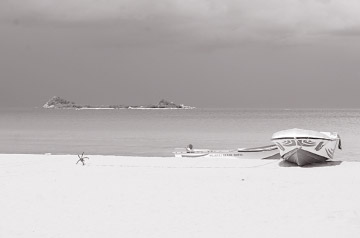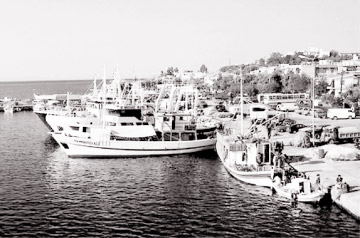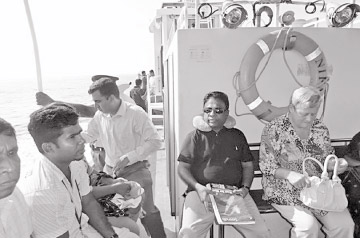|
Ocean and education:
Lanka’s future prosperity lies in the sea
By Prof. Ranjith Senarathne
|

The Nilaveli Beach, known as one of the best beaches in the
world
|
Sri Lanka possesses a territorial sea of 21,500 km2 and an Exclusive
Economic Zone (EEZ) of 517,000 km2, up to 200 nautical miles (370 km)
from the coastal line. Sri Lanka has the rights to the resources in the
water column, seabed and subsurface in the EEZ. According to the last
comprehensive survey conducted in 1979-80, an annual harvestable yield
of 250,000 tons is possible from coastal fishing and another 90,000 –
150,000 tons from the rest of the EEZ.
Under the UN Law of the Sea, Sri Lanka is entitled to claim an
extended area of seabed where the thickness of the sediment layer
exceeds one kilometre. This claim has been made and if accepted, Sri
Lanka could gain an additional seabed area. Therefore, the EEZ is likely
to expand further with the delimitation of the outer edge of the
continental margin of the country, which would permit Sri Lanka to own
an EEZ equivalent to 23 times (1.400,000 km2) its land mass. Apart from
living resources, this zone contains a variety of exploitable minerals
and hydrocarbons (oil and natural gas). Deposits containing titanium,
zirconium, thorium, cobalt, nickel, copper and manganese have already
been discovered.
In addition, Sri Lanka can promote oceanic recreational opportunities
such as surfing, whale and dolphin watching, deep sea diving, sea
entertainment and sea sport, targeting foreign tourists. With the dawn
of peace in the Northern and Eastern Provinces following the elimination
of terrorism, two thirds of the coastal area including some world-class
beaches such as Passikudah, Nilaveli and Arugam Bay are freely
accessible to tourists. Thus, maritime recreation and sea sports can be
an important foreign exchange earner for the country, which hitherto
remains almost untapped.
In view of the strategic location of Sri Lanka close to the world's
largest Silk Route (shipping lane), it could become the naval hub in the
region. Around 70,000 -80,000 ships presently navigate past Sri Lanka
annually. With the commissioning of the Hambantota Port, over 10,000
vessels will dock at the Hambantota Port annually, opening a whole new
world of attractive employment and income-generating opportunities.
The rich and enormous marine resource base (biological, chemical and
physical) in Sri Lanka including its EEZ, coupled with its strategic
location in the Indian Ocean, make it a country of great promise.
Therefore, the future prosperity of the country lies in the sea, and
it is of paramount importance to formulate appropriate strategies and
develop manpower in the fisheries, marine and maritime sectors to
harness the hitherto under-exploited and unexploited marine resources
and maritime potential of the country.
Ocean literate society
|

Fishing boats |
The oceans have always had a profound influence on man. In addition
to providing food, they have fascinated and inspired generations of
artists, writers, poets, composers and musicians. They have provoked the
imagination of adventures and explorers and stimulated the curiosity and
intellectual pursuits of scientists. For generations, low human
populations with low levels of technology have safeguarded the ocean
from human interference, but that is no longer so.
Studying the ocean is, by definition and scope, an inherently
inter-disciplinary process, cutting across and integrating the physical
and natural sciences with environmental, social/cultural, history, and
policy concerns. Ocean science can provide unique contribution to
challenge, excite, and inform young students about science and the role
of science in helping to meet and solve global challenges. The study of
oceans involves all scientific disciplines, many of the engineering
disciplines, and a significant fraction of the social sciences,
particularly history, cultural studies, economics. A sound awareness of
the oceans is a central feature of being a scientifically literate
citizen.
Studying and learning about the oceans can also excite young people
about the power and potential of science in ways few other singular
topics can.
Marine environments support the livelihoods, economies, and quality
of life for communities around the world. But growth of coastal
populations and increasing demands on marine resources are putting the
future ocean and coastal resources at risk through impacts, such as
fishing, wetland drainage, coastal urbanization, climate change, and
pollution of coastal waters. Therefore there is a greater need to have
capacity to assess, monitor, manage, and govern coastal and ocean
resources.
Ocean education
The Ocean University was established when President Mahinda Rajapaksa
was the Minister of Fisheries and Aquatic Resources with a view to
equipping the fisher folk with the new knowledge, skills and technology
so that it would lead to improving their productivity and socio-economic
standards. You may also add appropriately that Dullas Allahapperuma,
Minister of Youth Affairs and Skills Development is providing necessary
support to take the Ocean University to greater heights.
The Ocean University (National Institute of Fisheries and Nautical
Engineering) was established by the President MR in 1999 when he was the
Minister of Fisheries and Aquatic Resources. It has the mandate to
produce requisite manpower for the sustainable management and
utilization of fisheries, marine and maritime resources of the country.
It is the premier training and educational institution in fisheries
and allied sciences in Sri Lanka. It is headquartered in Colombo with
seven regional colleges, i.e. Kalutara, Galle, Tangalle, Batticaloa,
Trincomalee, Jaffna and Negombo. In order to cater to the current and
emerging manpower needs in the Fisheries, Marine and Maritime Sectors in
a globalized environment, it is proposed to transform NIFNE to a
full-fledged Ocean University in the near future.
Sri Lanka is an inland nation and the Indian Ocean is having a
profound impact practically on every aspect of the country such as its
climate, weather, industry, trade and commerce, nutritional security,
culture, politics, security, defence etc. and on the way of life of a
fair segment of its population. Yet, the knowledge of most of our people
about the ocean is next to nothing.
Though the ocean is of such an overwhelming importance, our system of
education has hitherto paid only scant attention to it.
|

A whale watching tour organised by the Ocean University |
We have learnt in a very expensive and painful manner what a tsunami
is. But, we still do not know if our education system has made any
systematic and concerted effort to produce ocean-literate citizens in
our country.
Though we have a coastline of 1700 km, only a very few can swim.
Even we are blessed with a huge marine resource base, we will not see
the underwater treasure, the grandeur and beauty of coral reefs; we will
never get inspired and fascinated by the sea or we will never feel for
ourselves the enormity of potential the ocean holds for us.
We need to overcome this misplaced fear (“hydrophobia”) for the sea.
The students at school should be taught about the ocean as a life
support system, and a module in this regard should be included in the
curriculum. Many good curricula already exist, (i.e.
Hawaii Marine Science Studies, University of South Florida’s Project
Oceanography), which may be used as guidelines to develop appropriate
ones for our country. We should also develop a cadre of well-trained
teachers who are passionately committed to studying and exploring the
ocean.
Ocean University
The vocational arm of the Ocean University proposes to set up “safe
sea swimming pools” in major towns along the coast with necessary life
support services. This may help to introduce the schoolchildren and the
youth of the country to the sea and foster curiosity for sea
exploration.
Children love to listen to stories, and there are many classic sea
stories, which can generate interest and curiosity about the sea in
children. We have to find and invite reputed and knowledgeable adults
good in storytelling for the radio and TV programmes for children. We
need to use the ocean and coastline as living laboratories and outdoor
classroom. We should teach and show our children how marine species
collectively create sustainable communities.
We need to focus on the interconnections of land and sea and the sea
and people. It is necessary to get students to be engaged in activities
such as snorkelling at night surrounded by bioluminescent planktons or
swimming through a kelp canopy.
We need to turn to ocean and its profound principles of life to
inspire the young generation.
Establishment of marine sanctuaries is a high priority environmental
and educational concern. Schools should arrange educational trips for
the staff and students to visit and study marine ecosystems until marine
sanctuaries are established.
In addition, setting up of public aquariums and showing films and
websites related to marine science prove useful. Like virtual zoos, we
need to strive to set up virtual marine sanctuaries.
Similar to safaris to Yala, Wilpattu, Bundala etc., we need to
arrange underwater safaris to witness the underwater treasures such as
corals, ornamental fish, sea grasses and other forms of underwater life.
Such safaris are not uncommon in foreign countries and are offered at
affordable rates. Cost-effective and safe “submarines” for use in
shallow waters, down to about 5-10 metres, can easily be turned out
locally.
We need to open up a new stream of degree programmes on Ocean
Sciences and allied fields at universities. Most of the postgraduate
courses presently offered by our universities on Natural Resource
Management (NRM) mainly focus on terrestrial systems and the treatment
on marine systems is only superficial.
Breaking away from traditional degree programmes in engineering, and
natural and social sciences, we need to introduce and promote courses
such as Marine Engineering, Naval Architecture, Nautical Science,
Off-shore Engineering, Marine Geology, Petro-science, Marine Biology,
Biodiversity Conservation, Aquaculture/Mariculture, Coastal and Marine
Resource Management, Applied Marine Sports Science and Technology,
Harbour Management, International Transportation Management and
Logistics, Marine Archaeology, Maritime Law etc. at undergraduate and
postgraduate level.
Current, emerging needs
These courses respond to the current and emerging needs in Marine and
Maritime Sectors in a globalized environment and can offer lucrative
employment opportunities for students in Science as well as in
Humanities and Social Sciences.
Some of these courses can be quite attractive even to foreign
students. Thus, they could also serve as a good source of income to
higher education institutions in Sri Lanka.
In addition, in order to cater to the current and emerging needs in
the fisheries, marine and maritime sectors of the country in the light
of Mahinda Chinthana- Forward Outlook, the Ocean University proposes to
offer the following vocational courses: Naval Architecture, Coastal Zone
Management, Marine Navigation, Oceanography, Nautical Science Safety at
Sea Ocean Resources Engineering Disaster Management Off-shore Surveying
and Digital Mapping, Fibreglass Technology, Boat Building, Marine
Engineering Technology, Maritime Heritage Fisheries and Aquaculture Sea
Sports and Maritime Recreation, Off-shore Fishing, Post-harvest
Technology, Marine Health Intl. Transportation Management and Logistics,
Marine Management Warehousing.
It is of paramount importance to develop human resources in the said
fields not only for the sustainable management of the fisheries, marine
and maritime resources, but also to harness optimal benefits from those
for the economic development and social well-being of the people of Sri
Lanka.
We need to get together and use the beauty and wonder of the oceans
to excite and challenge our schoolchildren and youth to learn and
understand more about the world they will soon be inheriting. The more
we understand our marine system the better choices that we can make.
Each of us by continuing ocean education, formal, informal and
non-formal, formulating appropriate policies and working with relevant
stakeholders can help make more intelligent and informed decisions that
are required to maintain a healthy, productive and rewarding planet.
In view of the rich ecological and biological diversity, scenic
beauty, tranquillity, high educational standards and strategic location
of the island, Sri Lanka could emerge as a global leader in Fisheries,
Ocean and Maritime Sciences. The Ocean University shall play a pivotal
role in this regard and pave the way for it.
The trained manpower produced by the Ocean University will lead to
sustainable management and utilization of fisheries, marine and maritime
resources of the country, which will contribute towards building a
competitive and robust economy in Sri Lanka.
The writer who holds PhD (Vienna) and PhD (Durham) h.c. is the
Chairman of Ocean University, Professor and Chairman, Department of Crop
Science, University of Ruhuna and Vice Chairman of the University Grants
Commission (UGC). |


